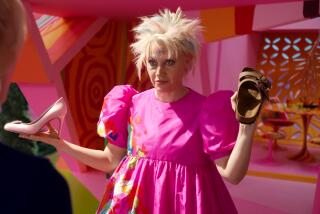Black Dolls--More Than Collectibles : Business: Store owner says her specialty helps children develop a ‘strong sense of identity.’
- Share via
Carolyn McMillan had been looking for a black doll for her 5-year-old daughter when she spotted one in an antique store three years ago.
It was perfect, a small porcelain baby doll with brown skin, curly hair and dressed in a white baptismal gown.
McMillan bought the doll for $35. She later learned it was valued at $650.
From then on, collecting black dolls became McMillan’s passion. Two years ago, she turned her hobby into a business, opening Dream Dolls and Memorabilia, the only store in the city that specializes in black dolls. She carries dolls that range from the $15 mass-produced variety to porcelain collectibles worth as much as $1,200.
Ethnic dolls are sold in many more stores than they were a few years ago, but quantities are still limited and dolls made as collectibles are harder to find, McMillan said.
In her Leimert Park store, there are imported dolls from Africa and black Kewpie dolls made by a California company that reproduces the popular 1913 variety. There are Imani dolls, high-fashion dolls similar to black Barbie dolls but with features that are more ethnically correct.
On the high end are two matching porcelain “grandma and grandpa” dolls, an elderly couple dressed in black and seated in rocking chairs, that sell for $1,200 each. There is a big-bellied Santa Claus doll handmade of wood for almost $400.
The store also carries reproductions of “Mammy” dolls.
Although some consider the stereotypical Mammy dolls controversial, McMillan said most of her customers are not offended because “most people see them in a historical context.”
One doll that seems to be a favorite among McMillan’s customers is the 22-inch “Honey Bun,” which sells for $500 and is one of 400 pieces by artist Louise Tierney, a doll maker from Massachusetts. “Her dolls are well-liked because they have realistic black features . . . full lips and curly hair,” McMillan said.
“I love Honey Bun the best,” said Caryn, McMillan’s daughter, who is now 8. “I like their clothes, hair, the way she looks.”
That’s fine with McMillan, who sees black dolls as more than just collectibles.
“Children begin developing a strong sense of their own identity at an early age,” McMillan said. “They need dolls that are in their own image and likeness so they can feel good about themselves.”
McMillan’s customers include other black parents who think the same way she does and are purchasing dolls for their children. But they also include adult collectors who are buying for themselves, including Whoopie Goldberg, a collector of black memorabilia, Rep. Maxine Waters (D-Los Angeles) and former Laker Norm Nixon.
Many black parents make special efforts to see that their children have black dolls because they don’t want them to grow up subconsciously believing that white is better.
In fact, an early measure of self-esteem can usually be seen in the way children relate to their dolls.
For example, a study that showed a tendency of black children to prefer white dolls to black ones was cited by the U.S. Supreme Court in its landmark 1954 decision to overturn school desegregation.
“It is important that children feel good about themselves,” McMillan said, adding that the importance of having dolls of different ethnic backgrounds should not be limited to blacks.
“This is a diverse country,” she said. “Whites, Asians and Mexican children see these dolls and they don’t see color . . . they see beauty.”
More to Read
Inside the business of entertainment
The Wide Shot brings you news, analysis and insights on everything from streaming wars to production — and what it all means for the future.
You may occasionally receive promotional content from the Los Angeles Times.










